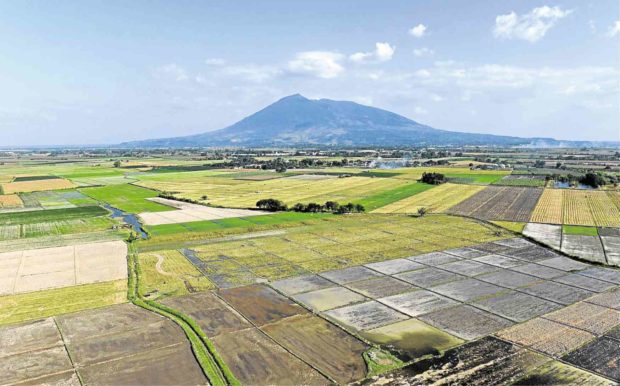
Magalang’s farms are enriched by Mt. Arayat as a backdrop. —EV Espiritu
MAGALANG, Pampanga — Genuine rest. An easy mountain trek. Quiet pilgrimage. A walk-through of the past.
Any of these activities will attract travelers to mountainous Magalang.
“Terrific Magalang” was how Rico Pableo Jr., executive director of the National Commission for Culture and the Arts, called the town after it hosted the cultural camp of more than 200 young artists from Asia last May.
Visitors often find life there unhurried and stress-free, Mayor Maria Lourdes Lacson said.
For those with a day or two to spare, hie off to resorts that sit on the slopes of Mt. Arayat in Magalang. Abe’s Farm, Orissa Garden of Wellness and Nauvoo operate year-round, rent out rooms or huts and cook nurturing meals. Fiona’s Farm in the northern part can take in much bigger crowds.
Abe’s Farm
Farm-to-table dishes are available at Apung Nida’s Farm, Charisma and Fishing Village. Because the town has more than 1,000 carabaos as farm animals, fresh milk is available but only if you wake up as early as 4 a.m.
Some pools use cold spring water and rent out cottages at affordable rates.
EV ESPIRITU
Arayat climb
The climb to the Magalang side of the 1,025-meter (3,366 feet) Arayat to reach Piedra Blanca (White Rock) or the historic Sitio Camansi (a plateau used as camp by Filipino revolutionaries) can take off from Barangay Ayala.
A few segments of that route are steep but manageable. Halfway or at the summit, the view of eastern Central Luzon or Mt. Pinatubo to the west is breathtaking.
Soothe your muscles in resort-based spas or hire local masseuses.
During Holy Week, Magalang’s Dalan Ning Krus (Way of the Cross) is a destination for pilgrims. Catholics come to reflect on the suffering and crucifixion of Jesus Christ through a life-size tableau installed by Soroptimist International.
Festivals
Visit the town in August for the Kamaru Festival, when mole crickets are cooked for various dishes.
Come, too, on the early night of Dec. 12 when a solemn religious procession called “Lubenas” is held at the town center.
Derived from the word “novena,” the Lubenas is held before the start of the nine Christmas Masses. The images of saints are followed and lit by handheld white lanterns with lacelike designs. The bearers dance to simple footwork.
At any time of the year, go to Pampanga State Agricultural University (PSAU) campus to enjoy a sweet tamarind drink or pick the fruit. PSAU runs a store that sells jams and wines from fruits.
The roadsides of Magalang are planted with sweet tamarind and pine trees.
Remnants of the past
The old town hosts four remnants of its past, which have been declared “important cultural properties” by the National Museum of the Philippines. These are the municipal hall, San Bartolome Church and two towers that relay signals through sunlight on mirrors.
Magalang’s San Bartolome Church
The Rizal monument, erected in 1923, is said to be one of the oldest in the country.
Colonial houses still stand, but several of these have been neglected.
A part of Arayat town in 1598, Magalang was established by the Augustinians in 1605. Its physical territory was revised twice, first by the founding families and second by the changing course of the then Parua (now Sacobia) River.
Its old four bells (dated 1886, 1887, 1889 and 1890) were rumored to have been borrowed by the late strongman Ferdinand Marcos for the wedding of his daughter, Irene, in Sarrat, Ilocos Norte province.
“Ensaymadas,” “pastillas” and other sweets make people drive all the way to Magalang.
“Our base product is the environment,” said Ryan Miranda, the municipal tourism officer.
Local officials, wanting to protect the town’s agriculture and tourism, rejected steel companies from doing business.
“Our main economic driver is agriculture, which we are enhancing. The natural landscape gives us an edge in tourism,” Lacson said.
Town hall —PHOTOS BY TONETTE T. OREJAS